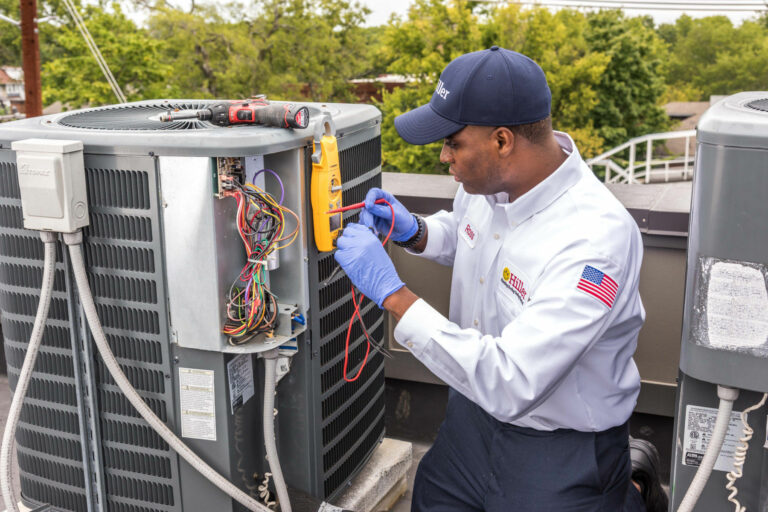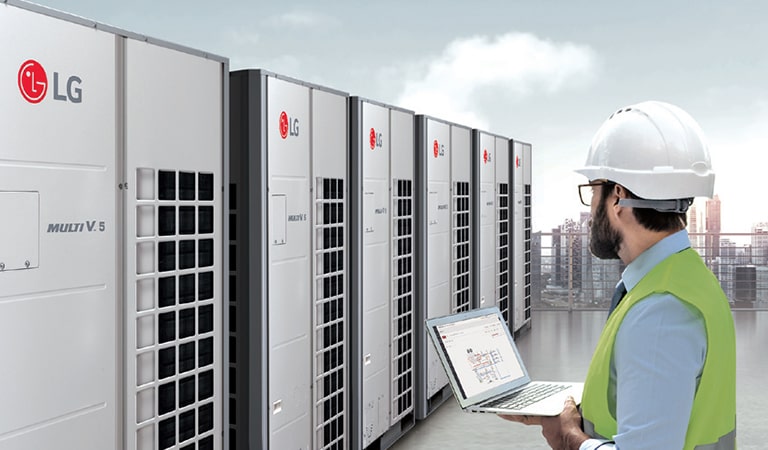DIY or Pro? heat pump service: What You Need to Know
DIY or Pro? heat pump service: What You Need to Know
Blog Article
Picking In Between a Heatpump and Furnace: Key Considerations for Your A/c Needs
When reviewing home heating choices for heating and cooling needs, the choice in between a heatpump and a furnace can be complex. Each system offers distinct benefits tailored to specific climates and energy effectiveness goals. Understanding these distinctions is vital for making an informed selection. Secret factors such as setup costs and ecological impact additionally complicate the option process. Which alternative genuinely aligns with one's convenience and sustainability choices? The adhering to sections will certainly discover these factors to consider in information.
Comprehending Warm Pumps: How They Function and Their Benefits
While many home owners think about different heating alternatives, understanding how heatpump feature and their advantages can greatly affect their choice. Heatpump run by transferring heat instead than creating it. In the winter months, they extract warm from the outside air or ground and move it inside, while in the summer, they reverse this procedure, cooling the home by expelling heat outside. This double capability makes them functional for year-round climate control.One of the main advantages of heatpump is their power performance. They use considerably much less electricity compared to standard heating unit, potentially leading to lower energy expenses (heat pump installation ooltewah tn). Additionally, heatpump have a smaller sized carbon impact, making them an eco-friendly option. They also call for much less upkeep than conventional systems, adding to long-lasting expense savings. Generally, recognizing the technicians and benefits of heatpump can assist property owners make educated choices concerning their heating and cooling needs
Exploring Heaters: Kinds, Operation, and Advantages
Heaters can be found in numerous kinds, including gas, electric, and oil versions, each with unique operational devices. Recognizing these distinctions is necessary, as they influence performance and home heating efficiency. In addition, heating systems supply many benefits, such as constant warmth output and dependability in chillier climates.
Sorts of Heaters
Furnace can differ considerably in design and operation, with furnaces being a preferred selection amongst homeowners. There are numerous sorts of heating systems, each utilizing various fuel resources and technologies. Gas heating systems are typical, leveraging gas to produce heat efficiently. Electric furnaces, on the various other hand, use electrical resistance to generate warmth, often preferred for their uncomplicated installation. Oil heaters, while much less common, are reliable in areas with limited gas accessibility (heat pump installation ooltewah tn). Furthermore, condensing furnaces make the most of power efficiency by reusing and capturing exhaust gases. Each type runs through a system of warm exchangers and ductwork to disperse warm air throughout a home. Understanding the distinctions in between these furnace types is necessary for notified cooling and heating decisions
Advantages of Furnaces
For property owners looking for trusted warmth during cool months, the advantages of heating systems are substantial. Heaters give constant home heating, ensuring even temperatures throughout the home. They are specifically effective in severe cold, frequently outmatching heatpump in freezing problems. Various types, including gas, electrical, and oil furnaces, provide adaptability to satisfy varied requirements and preferences.Furnaces likewise have a tendency to have lower preliminary installation prices compared to heatpump, making them an extra accessible choice for several. Their robust layout adds to a much longer life expectancy, with lots of systems lasting over 15 years with proper maintenance. Additionally, modern furnaces are typically equipped with innovative modern technology for boosted performance, which can bring about lowered power costs. On the whole, heaters stay a trustworthy option for efficient home heating.

Power Effectiveness: Contrasting Heat Pumps and Furnaces
When comparing power efficiency between warm pumps and furnaces, the Seasonal Energy Efficiency Ratio (SEER) plays a crucial role in figuring out performance. Furthermore, a functional price analysis reveals the lasting economic implications of each system. Comprehending these factors can direct house owners in making notified choices regarding their home heating solutions.
Seasonal Power Performance Proportion
Energy effectiveness plays an important function in the decision-making process between heatpump and heaters, especially when taking into consideration the Seasonal Power Performance Ratio (SEER) This statistics measures the cooling effectiveness of warm pumps over a whole air conditioning period, offering a standard method to examine performance. Greater SEER ratings suggest better energy performance, translating to reduced energy intake and decreased energy expenses. On the other hand, heating systems are commonly assessed making use of the Annual Fuel Usage Efficiency (AFUE) rating, which shows heating performance. When contrasting these 2 systems, homeowners need to focus on SEER scores for warm pumps, as they straight effect overall energy cost savings and environmental sustainability. A complete understanding of SEER can significantly affect the long-term satisfaction and cost-effectiveness of the picked HVAC solution.
Functional Cost Evaluation
Comprehending the operational expenses associated with heatpump and heaters is crucial for property owners reviewing their choices. Heat pumps commonly provide higher power efficiency, transforming electrical energy into warmth with very little waste. This causes lower regular monthly utility bills, specifically in moderate climates. Alternatively, standard heaters, especially gas versions, may have reduced upfront costs yet can incur greater functional expenditures gradually due to sustain prices and efficiency ratings.Moreover, heat pumps can work as both heating and cooling systems, potentially lowering the need for separate cooling and heating systems. While first investments for heatpump may be higher, their long-lasting financial savings in power efficiency can make them Get More Information a much more cost-efficient choice for lots of houses. Mindful analysis of local energy rates is important to establish the very best alternative.
Installation Costs: What to Expect for every Home Heating System
Installation prices her latest blog for furnace can vary significantly between heatpump and furnaces, influencing house owners' decisions. Heatpump normally have greater in advance installment expenses, generally ranging from $3,500 to $8,000, relying on the device dimension and complexity of setup. This includes the outdoor device, interior handling system, and necessary ductwork modifications. Conversely, heaters have a tendency to have lower preliminary prices, averaging in between $2,500 and $6,000, which can be appealing for budget-conscious property owners. Nonetheless, setup costs can enhance if substantial ductwork is required.Moreover, the selection of gas type for heaters-- all-natural gas, lp, or electric-- can likewise affect setup costs. While heatpump supply power efficiency, their first financial investment may hinder some purchasers. Eventually, assessing installation expenses alongside long-term cost savings and performance will help home owners in making notified choices about their furnace.
Climate Factors To Consider: Which System Executes Much Better in Your Area
How do climate problems affect the effectiveness of heating unit? The efficiency of warm pumps and furnaces can differ significantly depending upon the neighborhood environment. In moderate environments, heatpump excel by successfully transferring warm from the outdoors air, making them an energy-saving option. However, their efficiency decreases in incredibly cool temperatures, where they may battle to draw out enough heat. Conversely, furnaces, specifically gas designs, offer trusted and constant warmth regardless of outside problems, making them more effective in chillier regions.In areas that experience milder winters, heat pumps can operate effectively year-round, giving both cooling and heating. In comparison, areas with severe winter seasons frequently benefit from the toughness of heaters. Eventually, recognizing the regional environment is crucial when making a decision in between a heatpump and a heating system, as it directly discover this info here impacts their functional efficiency and overall performance.
Upkeep Demands: Long-Term Care for Warmth Pumps vs. Furnaces
While both warm pumps and heating systems require routine maintenance to ensure peak efficiency, their particular needs and treatment regimens vary substantially. Heating systems generally need much less frequent focus, with yearly assessments being adequate to examine for gas leaks, clean filters, and examine overall capability. Their easier design typically enables straightforward repairs.In contrast, heat pumps require biannual upkeep because of their twin role in home heating and air conditioning. This includes cleaning coils, checking cooling agent levels, and guaranteeing that both the interior and outside systems work at their finest. Furthermore, heatpump upkeep typically involves even more elaborate components, making expert maintenance essential.Neglecting upkeep can bring about decreased efficiency and enhanced power prices for both systems. Ultimately, homeowners must consider these long-lasting treatment requirements when picking between a heatpump and a heating system, as proactive upkeep can prolong the lifespan and efficiency of either system considerably.
Environmental Influence: Choosing a Lasting Home Heating Option
The ecological impact of home heating systems is an important examination for property owners seeking sustainable options. Heatpump are typically more energy-efficient than conventional heaters, as they transfer heat instead than generate it, considerably reducing carbon exhausts. By making use of renewable resource resources, such as geothermal or air-source heatpump, homeowners can further reduce their environmental footprint.On the various other hand, natural gas furnaces discharge greenhouse gases and add to air contamination, though they frequently give greater warmth outcome. Nevertheless, improvements in technology have brought about the development of high-efficiency heating systems that minimize emissions.Ultimately, choosing a heating unit entails considering effectiveness against environmental influence. Homeowners are encouraged to review local power resources and incentives for sustainable systems, ensuring an option that lines up with both personal convenience and ecological responsibility. The decision impacts not only prompt convenience however also long-term sustainability and ecological health.
Frequently Asked Questions
For How Long Do Heat Pumps and Furnaces Generally Last?
The life-span of heatpump generally varies from 15 to 20 years, while heaters can last in between 15 to thirty years. Regular maintenance considerably impacts their long life and efficiency in giving home heating options.
Can I Make Use Of a Heatpump in Incredibly Cold Climates?
Heatpump can operate in very cold environments, however their effectiveness lessens as temperatures decrease. In such conditions, extra home heating resources may be essential to preserve comfortable interior temperature levels and assure peak efficiency.

What Is the Noise Level of Warmth Pumps Versus Furnaces?
The noise levels of heatpump and heaters vary significantly. Generally, warmth pumps operate more quietly than traditional heaters, making them more effective for those sensitive to appear, while heating systems might generate louder operational sounds during heating cycles.
Are Warmth Pumps Suitable for Both Home Heating and Cooling?
Heatpump are undoubtedly suitable for both heating & cooling (heat pump replacement ooltewah tn). They function by transferring warm, providing efficient temperature control year-round, making them a functional option for house owners looking for an all-in-one cooling and heating solution
What Size Heater Do I Need for My Home?
Identifying the proper size heating unit for a home calls for assessing aspects such as square video, insulation quality, neighborhood climate, and the home's layout. Consulting a specialist can guarantee an accurate analysis and perfect convenience. Warmth pumps normally supply higher power efficiency, converting electrical power into warm with marginal waste. In moderate climates, warm pumps excel by efficiently transferring warm from the outside air, making them an energy-saving option. Alternatively, furnaces, specifically gas versions, provide dependable and consistent warm no matter of outside problems, making them better in chillier regions.In areas that experience milder winter seasons, heat pumps can operate effectively year-round, providing both heating and cooling. Heat pumps are normally much more energy-efficient than conventional heaters, as they transfer heat rather than produce it, substantially lowering carbon emissions. By making use of eco-friendly energy sources, such as air-source or geothermal heat pumps, home owners can even more reduce their environmental footprint.On the various other hand, all-natural gas heating systems give off greenhouse gases and add to air pollution, though they usually give greater warmth outcome.
Report this page